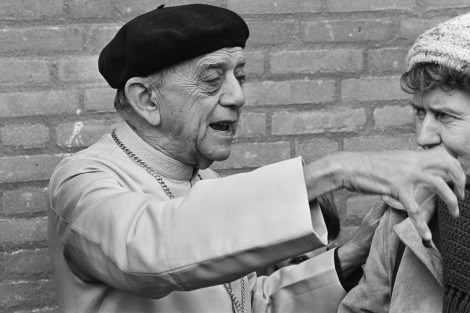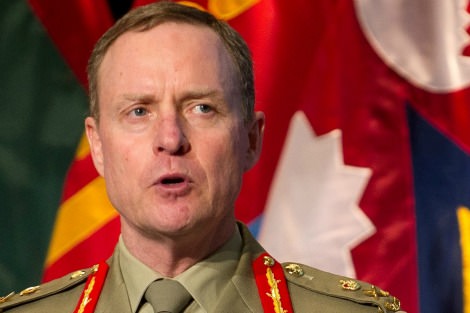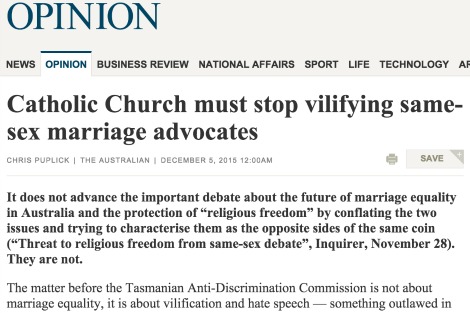Keywords: Australian Catholic Bishops Conference
There are more than 200 results, only the first 200 are displayed here.
-

RELIGION
- Frank Brennan
- 23 September 2016
18 Comments
'No good will be served by a royal commission auspiced by the state telling a Church how it judges or complies with its theological doctrines and distinctive moral teachings. By all means, set universal standards of practice expected of all institutions dealing with children, but do not trespass on the holy ground of religious belief and practice.' Fr Frank Brennan SJ addresses the Freedom for Faith Conference in Melbourne, 23 September 2016.
READ MORE
-

RELIGION
- Ann Deslandes
- 02 September 2016
19 Comments
Many Brazilians remember the 'Red Bishop' as much more than a defender of human rights. For these people, Helder Camara is included reverently in the litany of rogues who drew the ire of church and state authorities by demanding both do a better job of embodying a message of social justice. It was a powerful idea to grow up with: that this imposing and defining institution I had been born and baptised into contained a rebellious truth that often demanded we go against the institution's own grain.
READ MORE 
-

AUSTRALIA
- Frank Brennan
- 30 May 2016
5 Comments
'Being in the middle of an election campaign, I will not be making any partisan party political points. However being here in the bellwether seat of Eden-Monaro, I will conclude with a critique of both major political parties, and with one piece of political advice for citizens of goodwill seeking a national asylum policy more in harmony with the ideals set out by our bishops in their social justice statement.' Yass Catholic Parish Potluck Dinner, 28 May 2016
READ MORE
-

AUSTRALIA
- Donella Johnston
- 17 February 2016
18 Comments
The movement to end violence against women needs men in positions of influence, such as Australian of the Year David Morrison, to add their voices to those of the women spearheading the campaign. Male religious leaders can play an important role, but must first confront an important question: if one of the key causes of family violence is gender inequality, can they speak with authority if they are part of an institution that has no women episcopal decision-makers or leaders?
READ MORE 
-

RELIGION
- Moira Rayner
- 14 December 2015
48 Comments
There is a culture of brotherhood in the upper echelons of the Church. There is also a natural urge to homosocial reproduction in its instrumentalities. If I have learned anything from my work with companies and organisations on cultural change, it is that these comfortable cultures need to be broken up, because they are readily corrupted. The best way to change a culture is to start giving women positions of real influence and respect. They are outsiders, and outsiders see what insiders cannot.
READ MORE 
-

RELIGION
- Frank Brennan
- 11 December 2015
39 Comments
Chris Puplick, a former senator and former president of the NSW Anti-Discrimination Board, is one of a rising chorus expressing strong objections to the Australian Catholic bishops daring to evangelise and speak publicly about their views on same sex marriage. I too would be very upset if my bishops were saying, as Puplick claimed in an opinion piece in The Australian, that homosexuals are 'seriously depraved, intrinsically disordered, less than whole and messing with kids'. But they're not.
READ MORE 
-

ENVIRONMENT
- Paul Fyfe
- 11 December 2015
2 Comments
Twenty years ago I was hopeful that countries would take strong and sensible action to address climate change, just as we had in 1987 when we faced the major depletion of the ozone layer. The following years slowly erased this hope. The Church did not do enough to stem disappointment, or to affirm that 'stewardship' alone was not going to provide sufficient grounds for the needed changes. By 2010 I was resigned to devastation. But Pope Francis has provided me with a ray of hope.
READ MORE 
-

AUSTRALIA
- Frank Brennan
- 10 December 2015
I first met this Tony on my regular visits here to Darwin when he was working at the North Australian Aboriginal Legal Aid Service and then when he set up the mediation services under the auspices of Anglicare. In later years I knew him when he was your Anti-Discrimination Commissioner. He was a quiet, considered, gentle, strong and principled man. On Human Rights Day, it is only fitting that I honour Tony by offering some reflections on the architecture for human rights in Australia, on the contemporary human rights controversies, and on the way forward for better protection of the human rights of Aborigines and asylum seekers, two marginalised groups who had a special claim on Tony's sympathies.
READ MORE
-

RELIGION
- Michael McVeigh
- 07 December 2015
45 Comments
At the moment, the conversation on marriage equality vs traditional marriage is being driven by extremists on both sides, people who see the struggle as a polarised conflict with the goal of overwhelming victory. But most of us would find that victory unattractive no matter which side is triumphant. Instead, we can choose not to press the button, and to work together to allow both same-sex couples and practising Christians to live their beliefs faithfully, to the fullest of their flourishing.
READ MORE 
-

RELIGION
- Frank Brennan
- 04 December 2015
1 Comment
'Tonight, gathered here in the Southern Cross Club in the national capital, gathered as Eureka's children. We affirm that there is room for everyone under the Southern Cross. I hope you will return to Canberra carrying the Southern Cross flag when we proclaim the Australia Republic on 1 January 2020 which will be two elections after Australia last had a monarchist leader of a major political party. Tony Abbott is the last of his type. Whether the prime minister honoured to witness the proclamation is Malcolm Turnbull, Bill Shorten or another matters not.' Annual Dinner for Eureka's Children, Southern Cross Club, Canberra, 3 December 2015.
READ MORE
-

RELIGION
- Frank Brennan
- 27 November 2015
2 Comments
'The crisis of child sexual abuse in our societies has required that our institutional procedures be more transparent and that we learn from the ways of the world in exercising power openly and justly. This means we have to restructure some of our church arrangements so that power is exercised accountably and transparently. All of us who have positions of influence and power in institutional churches need to be attentive to the voices of those who have suffered within our institutions.' 'Discerning the place for the prophetic voice and pragmatic cooperation of the churches in the great moral questions of the age', address to the Association of Practical Theology in Oceania conference, 26 November 2015.
READ MORE
-

AUSTRALIA
- Frank Brennan
- 23 October 2015
4 Comments
Francis knows there are all sorts of issues inside and outside the Church where for too long people with power have tried to keep the lid on, in the hope that the problems and complexities will go away, often by parodying those who see the problems or complexities as small 'l' liberals or cafeteria Catholics. He delights in being joyful and troubled while contemplating big problems, calling people of good will to the table of deliberation reminding them of the kernel of the Christian gospels. He has the faith and hope needed to lift the lid without fear and without knowing the answers prior to the dialogue occurring.
READ MORE